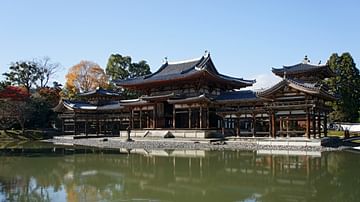Search
Search Results

Definition
Yayoi Period
The Yayoi Period is one of the oldest historical periods of Japan spanning from c. 300 BCE to c. 250 CE, preceded by the Jomon Period and followed by the Kofun Period. The name Yayoi comes from the district in Tokyo where the first artifacts...

Definition
Edo Period
The Edo period refers to the years from 1603 until 1868 when the Tokugawa family ruled Japan. The era is named after the city of Edo, modern-day Tokyo, where the Tokugawa shogunate had its government. It is also sometimes referred to as the...

Collection
Kingdoms and Periods of Ancient Egypt
The kingdoms and periods of ancient Egypt are modern-day designations for the history of the civilization. The people themselves did not refer to these eras by their modern terms but, instead, dated their history by the reign of a king or...

Definition
Ancient Egyptian Religion
Egyptian religion was a combination of beliefs and practices which, in the modern day, would include Egyptian mythology, science, medicine, psychiatry, magic, spiritualism, herbology, as well as the modern understanding of 'religion' as belief...

Definition
Heian Period
The Heian Period of Japanese history covers 794 to 1185 CE and saw a great flourishing in Japanese culture from literature to paintings. Government and its administration came to be dominated by the Fujiwara clan who eventually were challenged...

Definition
Hellenistic Period
The Hellenistic Period is a part of the Ancient Period for the European and Near Asian space. The use of this period is justified by the extent of the Hellenic culture in most of these areas, due to the Greek political presence especially...

Definition
Sengoku Period
The Sengoku Period (Sengoku Jidai, 1467-1568 CE), also known as the Warring States Period, was a turbulent and violent period of Japanese history when rival warlords or daimyo fought bitterly for control of Japan. The period falls within...

Article
Second Battle of the Marne - The Beginning of the End for Germany in WWI
The Second Battle of the Marne took place in July and August 1918 and saw Germany's last advance of the Spring Offensive rebuffed by a strong Allied counterattack. With hundreds of thousands of US troops landing in Europe each month and with...

Article
Ten Ancient Egypt Facts You Need to Know - Fun Trivia About Ancient Egypt
Ancient Egypt is defined as the civilization that flourished in North Africa between circa 6000 and 30 BCE – from the Predynastic Period in Egypt (circa 6000 to circa 3150 BCE) through the Ptolemaic Dynasty (323-30 BCE) before Egypt became...

Article
J. R. Giddings' Account of the Dade Massacre of the Second Seminole War
The Dade Massacre (also given as the Dade Battle, 28 December 1835) was the opening engagement of the Second Seminole War (1835-1842) between Euro-American forces and those of the Seminole, Black Seminole, and runaway slaves who had found...